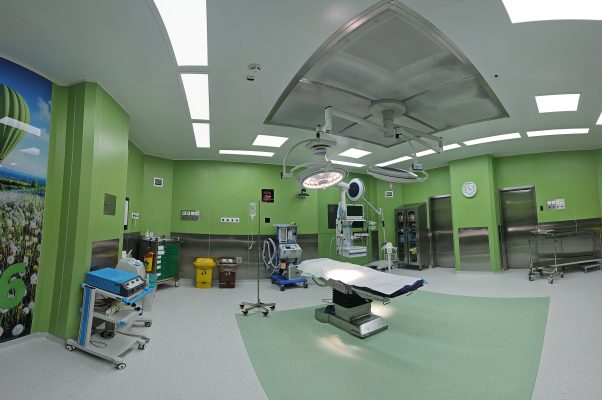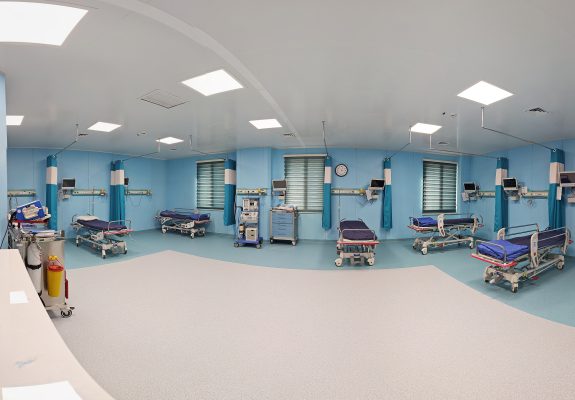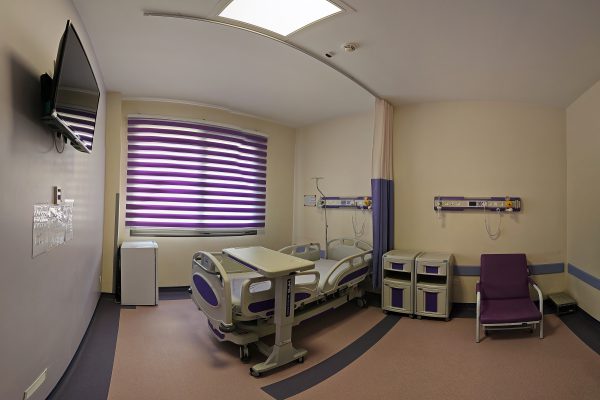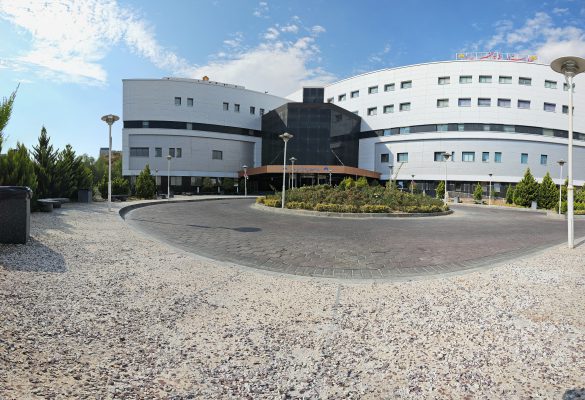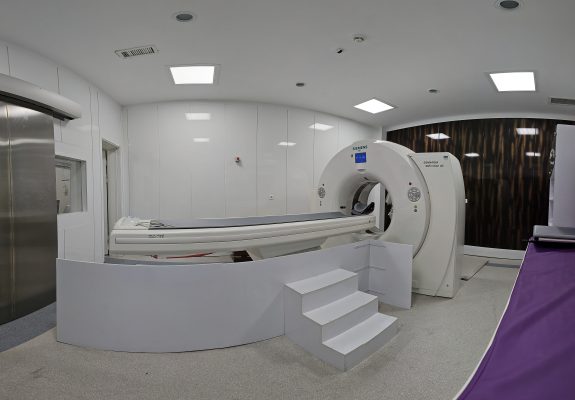Sleeve gastrectomy in Iran
Sleeve gastrectomy in Iran , also known as a vertical sleeve gastrectomy, is a surgical weight-loss procedure. This procedure involves removing about 80% of the stomach, leaving only a tubular portion about the size and shape of a banana.
If you want to operate in Tehran Adl Hospital, click the button below and follow the steps
Procedure
It is typically done laparoscopically, which involves inserting small instruments through multiple small incisions in the upper abdomen. After the stomach is removed, the surgeon reattaches the remaining portions with surgical staples, creating the “sleeve”.
Benefits
Sleeve gastrectomy in Iran provides a significant weight loss. It can help in improving many obesity-related conditions, such as:
– Type 2 diabetes
– High blood pressure
– High cholesterol
– Sleep apnea
It also restricts the amount of food the stomach can hold, causing a feeling of fullness after eating a small amount of food.
Risks
Like any major procedure, sleeve gastrectomy in Iran has potential health risks, both in the short term and long term. These may include:
– Infection
– Bleeding
– Blood clots
– Leaks from the line where parts of the stomach have been stapled together
– Poor nutrient absorption, leading to deficiencies
– Gastroesophageal reflux
After the Procedure
After a sleeve gastrectomy, patients need to follow a specific diet that begins with liquids only, then progresses to pureed, very soft foods, and finally more regular foods. They may also require a multivitamin supplement indefinitely to compensate for reduced nutrient absorption.
Regular follow-up visits are scheduled with the healthcare team to monitor the patient’s nutrition, lifestyle, and mental health, and to monitor weight loss, which can be dramatic.
The decision to have weight-loss surgery should come after careful consideration and consultation with an experienced bariatric surgeon or a knowledgeable primary care doctor, as well as a nutritionist and a mental health professional. It’s also important to remember that sleeve gastrectomy is an aid to support weight loss and will require significant lifestyle changes, including diet and exercise, for long-term success.
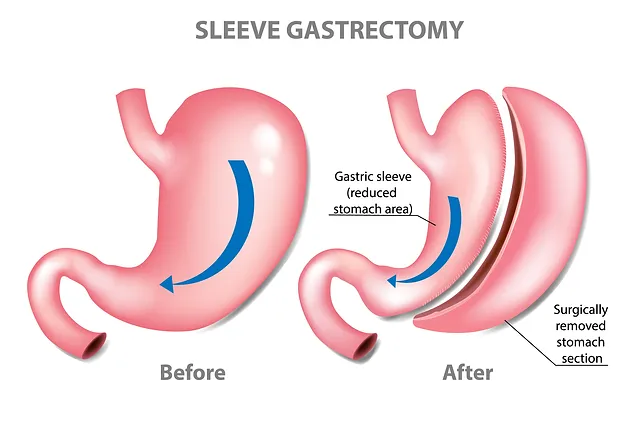
How you prepare for sleeve gastrectomy in Iran
Preparing for a sleeve gastrectomy, or any major surgery, involves several steps. Here are some general guidelines:
Medical Evaluation
First, you’ll undergo a thorough medical evaluation to ensure you’re healthy enough for the procedure. This may include blood tests, imaging studies, cardiac evaluation, and a sleep study if sleep apnea is suspected.
Nutritional Counseling
You’ll meet with a dietitian to discuss dietary changes. You’ll learn about what you’ll be able to eat and drink after the surgery, and which foods and drinks will need to be avoided.
Psychological Evaluation
A mental health professional will evaluate you to determine whether you’re mentally and emotionally prepared to undergo the procedure and make the necessary lifestyle changes afterward.
Physical Activity
Starting a regular physical activity program, if you don’t already have one, might be part of your preparation. Exercise is a crucial component of post-surgery lifestyle changes.
Preoperative Diet
Your surgeon may require you to lose some weight before surgery. This will help reduce the size of the liver and make the surgery safer. The diet typically is high in protein and low in calories, carbohydrates, and fats.
Medication Adjustment
You may need to stop or adjust some medications before surgery. This can include aspirin, ibuprofen, and other nonsteroidal anti-inflammatory drugs (NSAIDs). If you’re on blood thinners, your surgeon will discuss when to stop these medications. If you have diabetes, adjustments may be needed for your diabetes medications.
Abstaining from Tobacco and Alcohol
If you smoke, you’ll need to stop at least six weeks before surgery. Smoking can increase the risk of blood clots and respiratory complications. Alcohol can increase the risk of liver problems and complications after surgery.
Planning Ahead for Recovery
You’ll need to plan time off work for recovery. You should also arrange for help at home in the days to weeks following surgery.
Remember, the specific preparation may vary depending on your individual health status and the practices of your surgical team. Always consult with your healthcare provider for personalized instructions.
Recovery After sleeve gastrectomy
Recovery after a sleeve gastrectomy in Iran involves several stages and requires considerable lifestyle changes.
Immediately After Surgery
After surgery, you’ll be closely monitored by your healthcare team. Pain can be controlled with medications. You may have a catheter in your bladder to allow you to pass urine without getting up. You’ll also have a drip in your arm so that you can receive fluids. You’ll be encouraged to move about as soon as possible to prevent blood clots.
Hospital Discharge
The length of the hospital stay can vary, but you can expect to be discharged a few days after surgery. You’ll need to arrange for someone to drive you home.
Diet
In the early stages of recovery, you’ll be on a liquid diet. Over time, you’ll gradually transition to pureed foods, then to regular foods. This may occur over several weeks. It’s important to eat small, protein-rich meals and to chew your food thoroughly. Drinking fluids should be done between meals, not with meals to avoid stretching the stomach.
Activity
You’ll be encouraged to start light activities as soon as you feel up to it. Regular physical activity helps promote weight loss and overall health.
Follow-Up Appointments
You’ll have regular follow-up appointments with your healthcare team to monitor your recovery, discuss any concerns, and adjust your diet and activity level as needed.
Long-Term Lifestyle Changes
Successful weight loss after a sleeve gastrectomy requires long-term lifestyle changes. This includes a healthy diet, regular physical activity, and potentially lifelong vitamin/mineral supplementation. You may also benefit from support groups or counseling to help you cope with these changes.
Potential Complications
While many people recover from sleeve gastrectomy without complications, some people may experience issues such as nutrient deficiencies, gallstones, or gastroesophageal reflux.
Everyone’s recovery process is different, and it’s important to keep in close contact with your healthcare team, follow their instructions, and report any unusual symptoms or concerns. Remember, the goal is not only weight loss but also a healthier and more active life.
Good candidate for sleeve gastrectomy
Determining who is a good candidate for a sleeve gastrectomy in Iran is based on several factors. It’s a decision made in consultation with your healthcare provider, and typically involves consideration of the following:
1. BMI: A body mass index (BMI) over 40 is a common measure, or a BMI over 35 with serious weight-related health problems, such as type 2 diabetes, heart disease, or severe sleep apnea. In some cases, a sleeve gastrectomy may be considered for people with a BMI between 30 and 35 if they also have serious weight-related health problems.
2. Previous Attempts at Weight Loss: Usually, candidates for sleeve gastrectomy have tried to lose weight through diet, exercise, and behavioral changes but have not been successful in the long term.
3. Understanding and Commitment: A good candidate understands the risks and benefits of the surgery, as well as the lifestyle changes that will need to be made following the surgery. They must commit to long-term lifestyle changes, including diet and exercise.
4. Psychological Status: Patients should not have an untreated mental health condition, such as severe depression, substance abuse, or an eating disorder, which could make it difficult for them to maintain the lifestyle changes required after surgery.
5. No Certain Medical Conditions: Some medical conditions could increase the risks associated with having surgery or could be worsened by the surgery, such as certain liver diseases or blood clotting disorders.
Remember, these are general guidelines, and each individual’s situation is unique. Your healthcare provider will evaluate your overall health, your mental readiness, your understanding of the procedure, and your willingness to adhere to the lifestyle changes that will be necessary after the surgery.
Expect from sleeve gastrectomy
After undergoing a sleeve gastrectomy in Iran , you can expect several changes and results, including both physical and lifestyle changes. Here’s what you might generally expect:
Weight Loss
Substantial weight loss is one of the primary outcomes of this procedure. Most people lose 50-70% of their excess body weight within two years after surgery. However, individual results can vary widely and depend on your commitment to dietary changes and regular physical activity.
Improvement or Resolution of Obesity-Related Health Issues
Many people find that their obesity-related health issues, such as type 2 diabetes, high blood pressure, obstructive sleep apnea, and high cholesterol, improve or even resolve after surgery.
Dietary Changes
Your diet will change significantly after the surgery. Initially, you’ll be on a liquid diet, slowly transitioning to pureed and soft foods, and eventually, after several weeks, to regular foods. You’ll need to eat small, nutrient-rich meals and avoid high-fat, high-sugar foods and drinks.
Regular Exercise
You’ll be encouraged to engage in regular physical activity as this promotes weight loss and overall health.
Follow-up Appointments and Monitoring
You’ll have regular follow-up appointments with your healthcare team to monitor your health, make necessary adjustments to your diet or exercise plan, and address any complications or concerns.
Emotional Changes
Some people experience emotional changes after weight loss surgery. This can include mood swings, feeling depressed, or difficulty adapting to the new lifestyle changes. It’s important to communicate with your healthcare team about these feelings. Support groups can also be beneficial.
Potential Complications
While many people do not experience complications, potential risks can include nutrient deficiencies, gallstones, or gastroesophageal reflux. It’s important to follow your doctor’s advice about taking vitamin and mineral supplements and report any troubling symptoms as soon as possible.
Remember, while a sleeve gastrectomy can provide a tool for significant weight loss, the key to maintaining that weight loss long term is a commitment to dietary changes, regular exercise, and mental health support as needed.
Why sleeve gastrectomy done
Sleeve gastrectomy in Iran is performed as a treatment option for severe obesity. It’s considered when diet and exercise have not worked or when obesity-related health problems are serious.
Here are the main reasons why a sleeve gastrectomy is done:
1. Weight Loss: The primary reason for a sleeve gastrectomy in Iran is to help a person lose a significant amount of weight. By reducing the size of the stomach, it limits the amount of food that can be eaten at one time, leading to weight loss.
2. Health Improvement: Obesity often comes with various health problems, including type 2 diabetes, high blood pressure, heart disease, sleep apnea, and many others. Weight loss from a sleeve gastrectomy can improve or sometimes even resolve these conditions.
3. Quality of Life: Significant weight loss can improve a person’s overall ability to perform daily activities, increase mobility, and enhance self-esteem and mental health.
4. Long-Term Weight Management: For individuals with severe obesity, non-surgical methods of weight loss may have failed to provide long-term, sustainable results. Sleeve gastrectomy in Iran , along with lifestyle changes, can help with long-term weight management.
It’s important to note that while a sleeve gastrectomy can greatly assist with weight loss, it’s not a guaranteed solution on its own. It should be viewed as a tool to assist with weight loss and needs to be combined with a commitment to a healthier lifestyle, including a balanced diet and regular exercise, for the best results. Additionally, the procedure isn’t appropriate for everyone with obesity. Doctors often use a person’s body mass index (BMI) and overall health to determine who may benefit.
What is BMI
BMI, or Body Mass Index, is a measure that is often used to assess whether a person has a healthy body weight for their height. It’s a simple calculation that divides a person’s weight in kilograms by the square of their height in meters.
The resulting BMI score can be interpreted using the following categories, according to the World Health Organization (WHO) standards:
– Underweight: BMI less than 18.5
– Normal weight: BMI 18.5–24.9
– Overweight: BMI 25.0–29.9
– Obesity class I (Moderate): BMI 30.0–34.9
– Obesity class II (Severe): BMI 35.0–39.9
– Obesity class III (Very severe or morbid): BMI 40 or higher
It’s important to note that while BMI can be a useful tool for identifying populations at risk due to excess weight, it is a somewhat crude measure that does not directly assess body fat or its distribution. It doesn’t distinguish between weight from muscle and weight from fat. Therefore, someone with a lot of muscle mass, like an athlete, may have a higher BMI but not be overweight or obese. Similarly, older people, who often have more body fat than younger people, might have a similar BMI but different body fat distribution.
So, while BMI is a useful starting point, it shouldn’t be used in isolation to determine a person’s overall health. Other factors, such as waist circumference, diet, physical activity level, and other health indicators, should also be considered.
Diet after sleeve gastrectomy
After a sleeve gastrectomy in Iran , your diet will change significantly. Your stomach is much smaller after the surgery, so you’ll feel full quickly. Here’s a general guideline on what your diet might look like after surgery:
Stage 1: Clear Liquids
For the first day or two after surgery, you’ll be limited to clear liquids. This can include:
– Water
– Clear broths
– Sugar-free gelatin
– Sugar-free popsicles
– Decaffeinated tea
Stage 2: Full Liquids
After tolerating clear liquids, you’ll move on to other liquids:
– Skim or 1% milk
– Low-fat, sugar-free yogurt
– Sugar-free pudding
– Thin soup and broth with soft, well-cooked noodles
– Protein shakes
Stage 3: Pureed Foods
After about a week, you can begin eating pureed (blended) foods. This can include:
– Pureed fruits and vegetables
– Pureed lean meats
– Pureed beans and legumes
– Pureed low-fat, sugar-free yogurt
– Pureed low-fat, sugar-free cottage cheese
Stage 4: Soft Foods
After a few weeks of pureed foods, you can begin eating soft, easy-to-chew foods:
– Soft-boiled eggs
– Soft fruits and vegetables
– Soft, lean meats like fish
– Cooked cereal
Stage 5: Solid Foods
After about 8 weeks post-surgery, you can gradually begin to reintroduce solid foods into your diet.
Throughout all stages, it’s important to:
– Eat and drink slowly.
– Wait 30 minutes after eating to drink liquids. Drinking while eating can cause discomfort and lead to overeating.
– Chew your food thoroughly.
– Prioritize protein in your meal.
– Avoid high-sugar and high-fat foods.
– Stay hydrated by drinking low-calorie, non-carbonated beverages throughout the day.
– Take vitamin and mineral supplements as recommended by your doctor.
Remember, everyone’s body responds differently to surgery, and these timelines can vary. Always follow your healthcare provider’s specific guidelines for your diet after surgery. It’s also a good idea to work with a dietitian who can provide personalized advice and meal plans.



